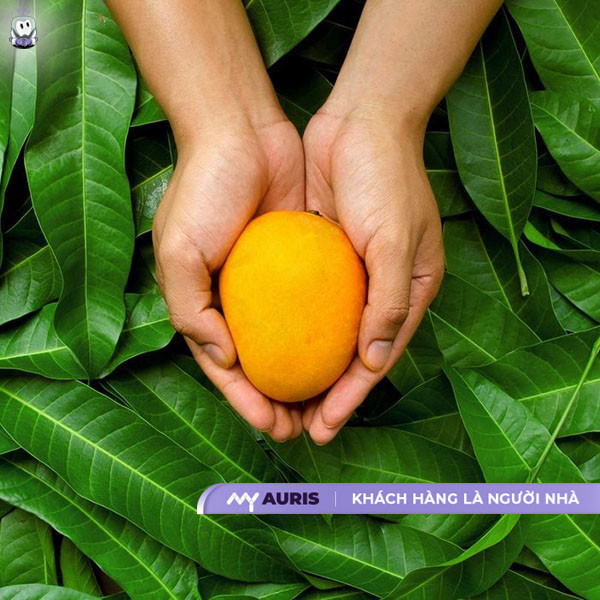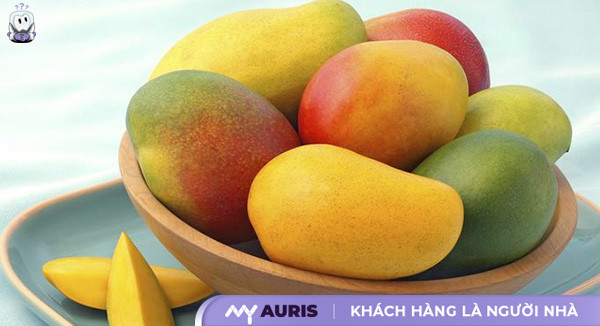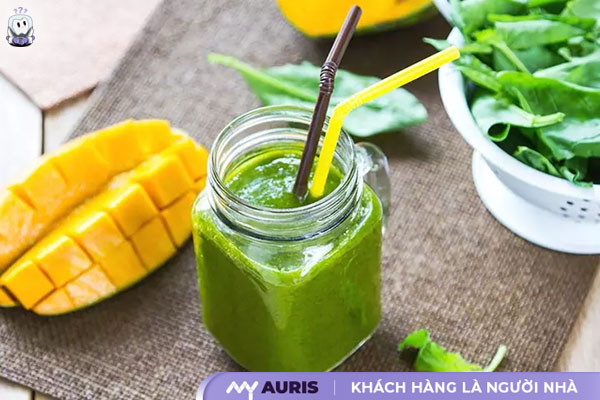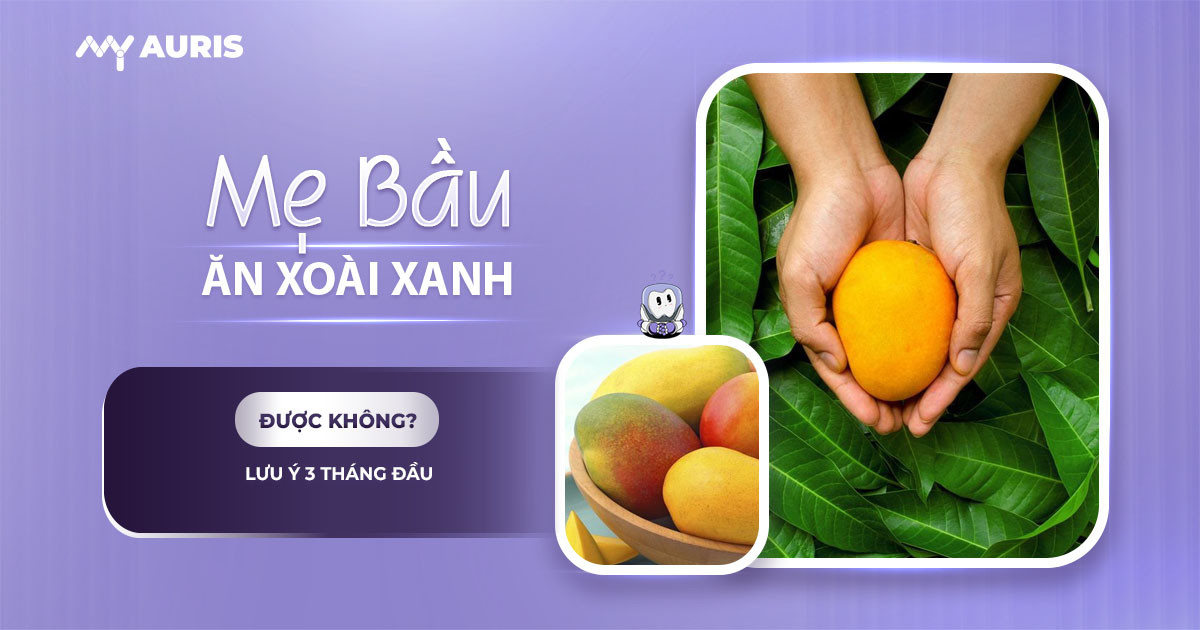Green mango is a popular fruit, available almost year-round in Vietnam. Not only does it stimulate the taste buds with its characteristic tangy flavor, but green mango also contains many essential vitamins and minerals such as vitamins C, A, B6, along with folate and fiber. With its diverse nutritional composition, green mango helps strengthen the immune system, improves digestion, and contributes significantly to the comprehensive development of the fetus. Therefore, pregnant women can completely feel assured about adding green mango to their diet in a reasonable manner.
Can Pregnant Women Eat Green Mango?
It is entirely possible for pregnant women to eat green mango, provided they know how to choose and consume it properly. Green mango is a popular fruit, available year-round, and contains many essential nutrients for pregnancy. Contrary to the belief that mango is “hot” (causes internal heat), especially for pregnant women, nutrition experts affirm that mango is a very beneficial fruit.
In 100g of mango, there are approximately 60 Kcal, 0.8g protein, 0.4g fat, along with a host of important vitamins such as vitamins A, C, B6, sugar, and fiber – all of which positively support the health of the pregnant woman and the development of the fetus. Therefore, mango offers many benefits for pregnant women if consumed correctly.
However, to ensure safety, pregnant women should choose mature green mangoes that are less sour and have less sap. Only eat 2-3 slices at a time to avoid affecting the digestive system. Avoid very young mangoes as they often contain a lot of sap, which can cause digestive discomfort such as nausea, bloating, or mild diarrhea.

Can Pregnant Women Eat Mango in the First Trimester?
Many people worry that mango is a “hot” fruit (causes internal heat), which could affect the health of the mother and fetus, especially during the first trimester of pregnancy. However, according to nutrition experts, pregnant women can absolutely eat mango if consumed correctly, at the right time, and in specific amounts.
Both ripe and green mangoes offer many nutritional benefits for pregnant women. When consumed appropriately, mango supports the absorption of essential nutrients for fetal development and helps enhance the mother’s health.
Specifically, 100g of ripe mango contains the following significant nutritional values:
| Nutrient | Amount | Nutrient | Amount |
| Calories | 94 Kcal | Calcium | 34 mg |
| Fat | 0.64g | Iron | 0.6 mg |
| Carbohydrates | 23.5g | Sodium | 3 mg |
| Protein | 1.71g | Zinc | 0.42 mg |
| Fiber | 4g | Copper | 0.2 mg |
| Vitamin A | 110 IU | Magnesium | 37 mg |
| Vitamin C | 13.7 mg | Phosphorus | 21 mg |
| Vitamin B6 | 0.1 mg | Potassium | 303 mg |
| Folate | 24 mcg | Manganese | 0.2 mg |
With the nutritional content table above, it’s clear that mango is a good choice for pregnant women in their first trimester if consumed correctly. Eating mango at appropriate times and avoiding overconsumption will help pregnant women absorb maximum nutrients while remaining safe for the fetus.

Is It Good for Pregnant Women to Eat Mango?
Green mango is not only delicious but also offers numerous health benefits for pregnant women throughout their pregnancy. Here are the reasons why eating green mango is a worthwhile consideration for expectant mothers:
Boosts the Immune System
Mango is rich in vitamin C, which helps strengthen the immune system and enhance resistance for both mother and baby, thereby preventing illnesses during pregnancy. Therefore, don’t overlook green mango if you are pregnant.
Reduces Morning Sickness
Thanks to its vitamin B6 content, green mango helps alleviate morning sickness, especially effective in the first month of pregnancy. Its natural sour and crispy taste, combined with a little salty and spicy seasoning, stimulates the taste buds, thereby effectively combating nausea.
Supplements Iron, Prevents Anemia
The iron content in mango helps pregnant women supplement iron from a natural food source. Moreover, the vitamin C in mango supports better iron absorption, thereby preventing iron-deficiency anemia – a common condition during pregnancy. Ripe mango is a good choice for a daily diet.
Prevents Fetal Birth Defects
Green mango is a rich source of folic acid, an important nutrient that helps prevent fetal birth defects, especially neural tube defects, and supports the development of the baby’s nervous system.
Prevents Constipation
Rich in fiber, mango helps improve the digestive system and effectively prevents constipation in pregnant women. Additionally, enzymes in mango and its natural alkalinity help break down proteins, leading to quicker and easier digestion.
Good for Oral Health
Pregnant women are often prone to oral health issues. Eating green mango helps strengthen gum health, prevents tooth decay, combats bleeding gums, and reduces bad breath, helping mothers feel more confident every day.
Helps Beautify Skin
Vitamin A in mango promotes blood circulation in mucous membranes and skin surface, helping to reduce clogged pores and nourish the skin from within. Additionally, pregnant women can use ripe mangoes to make natural face masks, safely and effectively improving their skin.
Two Mango Dishes Loved by Pregnant Women in Their First Trimester
Pregnant women in their first trimester can enjoy mango not only in traditional ways but also transform it into many delicious and nutritious dishes. Here are 2 favorite dishes that expectant mothers should not miss:
Mango Soursop Smoothie
This is one of the mango dishes favored by pregnant women because it’s both delicious and easy to make. With just a few basic ingredients, you can have a fragrant, refreshing, and healthy smoothie.
Smoothie Ingredients:
- 100g soursop
- 100g ripe mango
- 1 teaspoon fresh milk, condensed milk
- Ice cubes, as needed
Instructions:
Step 1: Prepare the soursop by removing the seeds and placing the flesh in a bowl. Peel the mango and cut it into small pieces for easier blending.
Step 2: Put the soursop, mango, fresh milk, and condensed milk into a blender and blend until smooth. You can adjust the taste according to the sweetness of the mango.
Step 3: Add ice cubes and blend until the mixture is smooth. Pour into a glass and enjoy immediately while cold.

Mango Mousse
If you’re looking for a no-bake dessert, mango mousse is an ideal choice. This dish helps combat food fatigue and provides a refreshing sensation, especially suitable for pregnant women during summer days.
Mousse Ingredients:
- 220ml whipping cream
- 200g cream cheese
- 30ml fresh milk
- 200g ripe mango
- 120g sugar
- 3 gelatin leaves
- Cooled boiled water
Instructions:
Step 1: Peel and dice the mango, then add fresh milk and blend until smooth. Soak gelatin in cold water, then mix it with the mango puree, and double-boil until the gelatin is completely dissolved.
Step 2: Beat the cream cheese until smooth, then fold in the cooled mango mixture. Whip the whipping cream until stiff peaks form, then gently combine all ingredients.
Step 3: Arrange the cake base in a mold, pour in the mousse mixture, then add a second cake layer and pour the remaining mousse. Refrigerate to set the cake.
Step 4: Create the top layer by blending mango with water, then strain to get a smooth liquid. Soak gelatin, gently heat it with the mango liquid until dissolved, then pour this glaze over the cake. Refrigerate for at least 6 hours to complete the mousse.
Harmful Effects of Eating Mango Incorrectly During the First Trimester of Pregnancy
Mango is a nutrient-rich fruit, popular in the Vietnamese diet. However, for pregnant women in their first trimester, consuming mango incorrectly can lead to unexpected harmful effects on the health of both mother and baby.
Pregnant women who eat too much green mango may experience:
- Sensitive teeth, increased stomach acid levels: Green mangoes contain a lot of acid, which can easily cause tooth sensitivity and irritate the stomach lining. Mothers with a history of stomach problems need to be especially cautious.
- Adverse effects on mother and baby’s health when dipping with fermented shrimp paste or spicy chili powder: This is a common habit but carries potential risks of poor hygiene, digestive disorders, or increased blood pressure.
- Allergy to young mangoes, mango sap: Some pregnant women may experience skin allergies or stomach discomfort when exposed to sap from green mangoes.
Eating too much ripe mango is also not good for pregnant women:
- Risk of gestational diabetes: Ripe mango has a high sugar content, which if not controlled, can increase the risk of diabetes, especially for mothers with a history of diabetes. Only about half a mango should be eaten per day.
- High calorie content: Ripe mango can easily lead to excessive weight gain in mothers, making it difficult to control gestational weight.
- Artificially ripened mangoes contain chemicals: Some mangoes ripened with harmful chemicals can cause headaches, dizziness, stomach discomfort, and affect fetal development.
How to Choose Chemical-Free Mangoes for Pregnant Women in the First Trimester
To ensure safety, here are some tips for choosing delicious, chemical-free mangoes for pregnant women:
- Mango skin: Choose fruits with an even yellow color, taut skin, and no tiny dark spots.
- Mango stem: The stem should still be firm, and when pressed lightly, it should give slightly, which is a sign of natural ripening.
- Natural aroma: A truly ripe mango will have a rich, sweet, pleasant aroma, especially from the stem.
- Firmness of mango: Choose a fruit that feels firm in hand, with flexible flesh, and good elasticity when gently squeezed.
- Reputable store: Buy from a place that sells clearly inspected fruits, ensuring the best quality for both mother and baby.
Although both green and ripe mangoes provide valuable nutrients for pregnant women, they should be consumed correctly and reasonably. During the first trimester of pregnancy, if eaten in moderation, mango can help prevent morning sickness and provide essential nutrients, supporting a healthy fetus. Always prioritize choosing natural mangoes with clear origins to best protect the health of both mother and baby.





